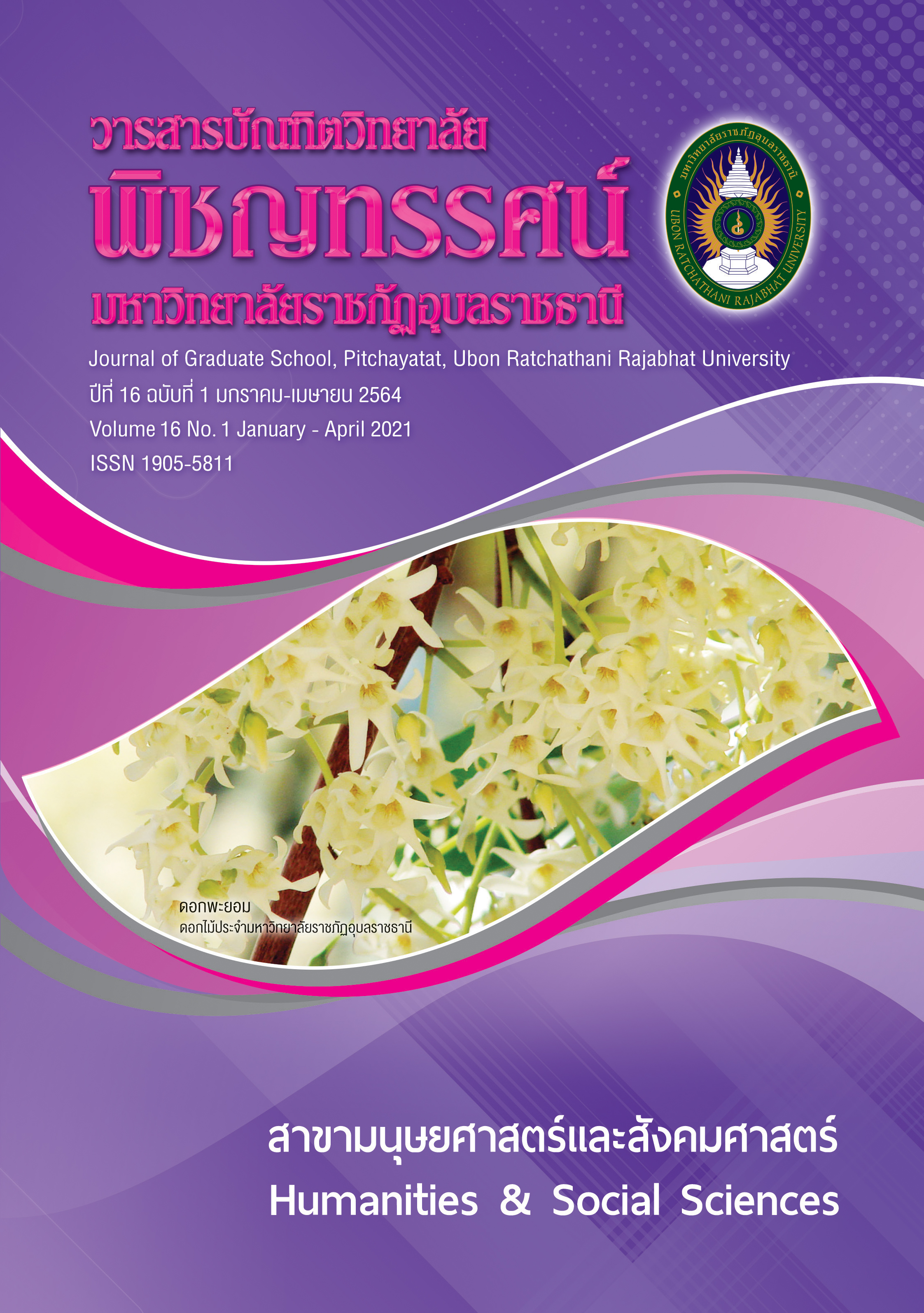การบริหารจัดการของผู้บริหารสถานศึกษาและครูที่มีต่อการดำเนินงาน โรงเรียนวิถีพุทธ สังกัดสำนักงานเขตพื้นที่การศึกษาประถมศึกษาศรีสะเกษ เขต 3
คำสำคัญ:
การบริหารจัดการ, โรงเรียนวิถีพุทธบทคัดย่อ
การวิจัยนี้มีวัตถุประสงค์เพื่อ 1) เพื่อศึกษาความคิดเห็นของผู้บริหารสถานศึกษาและครูที่มีต่อ
การดำเนินงานโรงเรียนวิถีพุทธ 2) เพื่อเปรียบเทียบความคิดเห็นของผู้บริหารสถานศึกษาและครูที่มีต่อการดำเนินงานโรงเรียนวิถีพุทธ จำแนกตามวุฒิการศึกษา ตำแหน่งปัจจุบัน และขนาดโรงเรียน และ 3) ศึกษาปัญหาและแนวทางในการพัฒนาการดำเนินงานโรงเรียนวิถีพุทธ สังกัดสำนักงานเขตพื้นที่การศึกษาประถมศึกษาศรีสะเกษ เขต 3 กลุ่มตัวอย่างที่ใช้ในการวิจัยครั้งนี้ ได้แก่ ผู้บริหารสถานศึกษาและครูโรงเรียนวิถีพุทธ สังกัดสำนักงานเขตพื้นที่การศึกษาประถมศึกษาศรีสะเกษ เขต 3 จำนวน 314 คน เครื่องมือที่ใช้ ได้แก่ แบบสอบถาม สถิติที่ใช้ในการวิเคราะห์ข้อมูลคือ ร้อยละ ค่าเฉลี่ย ส่วนเบี่ยงเบนมาตรฐาน การทดสอบที และการทดสอบเอฟ และทำการทดสอบความแตกต่างรายคู่ โดยวิธี เชฟเฟ่
ผลการวิจัยพบว่า
- ความคิดเห็นของผู้บริหารสถานศึกษาและครูที่มีต่อการดำเนินงานโรงเรียนวิถีพุทธ โดยรวมและรายด้านอยู่ในระดับมาก
- ผลการเปรียบเทียบความคิดเห็นของผู้บริหารสถานศึกษาและครูที่มีต่อการดำเนินงานโรงเรียนวิถีพุทธ จำแนกตาม วุฒิการศึกษา ตำแหน่งปัจจุบัน และขนาดของโรงเรียน พบว่า โดยรวมแตกต่างกันอย่างมีนัยสำคัญ
- การศึกษาปัญหาและแนวทางในการพัฒนาการดำเนินงานโรงเรียนวิถีพุทธ สังกัดสำนักงานเขตพื้นที่การศึกษาประถมศึกษาศรีสะเกษ เขต 3 พบว่า 1) ปัญหา สถานศึกษาไม่ได้วิเคราะห์สภาพของโรงเรียน จัดกิจกรรมไม่สอดคล้องกับวิถีพุทธ บุคลากรขาดการอบรมวิถีพุทธ และชุมชนไม่ให้ความร่วมมือพัฒนาโรงเรียนวิถีพุทธ 2) แนวทางในการพัฒนา ควรวิเคราะห์สภาพของโรงเรียน จัดกิจกรรมให้สอดคล้องกับวิถีพุทธ ส่งบุคลากรเข้ารับการอบรม และร่วมมือกับชุมชนในการพัฒนาโรงเรียนวิถีพุทธ
เอกสารอ้างอิง
ศึกษาธิการ, กระทรวง. แนวทางการดำเนินงานโรงเรียนวิถีพุทธ. กรุงเทพฯ: โรงพิมพ์องค์การรับส่งสินค้าและพัสดุภัณฑ์, 2546.
ศึกษาธิการ, กระทรวง. แผนพัฒนาการศึกษาของกระทรวงศึกษาธิการ ฉบับที่12 (พ.ศ. 2560 - 2564). กรุงเทพฯ: สำนัก นโยบายและยุทธศาสตร์ สำนักงานปลัดกระทรวงศึกษาธิการ, 2559.
เขตพื้นที่การศึกษาประถมศึกษาศรีสะเกษ เขต 3, สำนักงาน. รายงานการพัฒนาคุณภาพการศึกษาประจำปีของสถานศึกษาระดับเขตพื้นที่การศึกษาประถมศึกษาศรีสะเกษ เขต 3 ปีการศึกษา 2560. สำนักงานเขตพื้นที่การศึกษาประถมศึกษาศรีสะเกษ เขต 3: จังหวัดศรีสะเกษ, 2560.
จุฑามณี ปัญญายิ่ง. การจัดการศึกษาโรงเรียนวิถีพุทธของสำนักงานเขตพื้นที่การศึกษามัธยมศึกษาเขต 1. วิทยานิพนธ์ปริญญาศึกษาศาสตรมหาบัณฑิต มหาวิทยาลัยราชภัฏสวนดุสิต, 2558.
จิรวดี ชุติพงศ. แนวทางการบริหารงานของโรงเรียนวิถีพุทธ สังกัดสำนักงานเขตพื้นที่การศึกษาประถมศึกษาชัยนาท. วิทยานิพนธ์ปริญญาครุศาสตรมหาบัณฑิต มหาวิทยาลัยราชภัฏนครสวรรค์, 2562.
จีระวรรณ พรศิริ. การบริหารจัดการโรงเรียนวิถีพุทธในโรงเรียนสังกัดสำนักงานเขตพื้นที่การศึกษาประถมศึกษา ชลบุรี เขต 3. วิทยานิพนธ์ปริญญาครุศาสตรมหาบัณฑิต มหาวิทยาลัยราชภัฏกาญจนบุรี, 2555.
ชุติกาญจน์ ปกติ. ประสิทธิผลการบริหารงานโรงเรียนวิถีพุทธในสถานศึกษาของรัฐ สังกัดสำนักงานเขตพื้นที่การศึกษามัธยมศึกษา เขต 30. วิทยานิพนธ์ปริญญาครุศาสตรมหาบัณฑิต มหาวิทยาลัยราชภัฏพระนครศรีอยุธยา, 2561.
เถลิงศักดิ์ อรุณคีรีวัฒน์. สภาพการจัดการศึกษาตามแนวดำเนินการโรงเรียนวิถีพุทธของสถานศึกษาขั้นพื้นฐาน สังกัดสำนักงานเขตพื้นที่การศึกษาราชบุรี เขต 2. วิทยานิพนธ์ปริญญาครุศาสตรมหาบัณฑิต มหาวิทยาลัยราชภัฏหมู่บ้านจอมบึง, 2554.
นารี ทองฉิม. การดำเนินงานโรงเรียนวิถีพุทธสู่ความเป็นโรงเรียนวิถีพุทธชั้นนำของสถานศึกษาสังกัดสำนักงานเขตพื้นที่การศึกษาประถมศึกษาสงขลา เขต 1. วิทยานิพนธ์ปริญญาพุทธศาสตรมหาบัณฑิต มหาวิยาลัยมหาจุฬาลงกรณราชวิทยาลัย, 2563.
ปณิตา ดาผาวัน. สภาพและปัญหาการดำเนินงานโรงเรียนวิถีพุทธของผู้บริหารสถานศึกษาและครู สังกัดกรุงเทพมหานคร กลุ่มกรุงเทพกลาง. วิทยานิพนธ์ปริญญาครุศาสตรมหาบัณฑิต มหาวิทยาลัยราชภัฏจันทรเกษม, 2554.
พระครูใบฎีกาสุวินท์ สุวิชาโน. การพัฒนาการบริหารจัดการโรงเรียนวิถีพุทธในจังหวัดสมุทรปราการ. วิทยานิพนธ์ปริญญาพุทธศาสตรมหาบัณฑิต มหาวิยาลัยมหาจุฬาลงกรณราชวิทยาลัย, 2553.
พระครูสังฆ์ถวิล สุนโน. ศึกษาผลการดำเนินงานโครงการโรงเรียนวิถีพุทธ:กรณีศึกษากลุ่มโรงเรียนสังกัดสำนักงานเขตพื้นการศึกษาประถมศึกษาแพร่ เขต 2. วิทยานิพนธ์ปริญญาพุทธศาสตรมหาบัณฑิต มหาวิยาลัยมหาจุฬาลงกรณราชวิทยาลัย, 2558.
ราตรี รัตนโสภา. การศึกษาการดำเนินงานโรงเรียนวิถีพุทธในจังหวัดพระนครศรีอยุธยา. วิทยานิพนธ์ปริญญาพุทธศาสตรมหาบัณฑิต มหาวิยาลัยมหาจุฬาลงกรณราชวิทยาลัย, 2560.
ศรีสุดา รัตนะ. สภาพปัญหาการดำเนินงานโรงเรียนวิถีพุทธในจังหวัดตรัง. วิทยานิพนธ์ปริญญาครุศาสตร์มหาบัณฑิต มหาวิทยาลัยราชภัฏสงขลา, 2555.
สริญญา มาตนอก. ปัญหาและแนวทางการดำเนินงานโรงเรียนวิถีพุทธสังกัดสำนักงานเขตพื้นที่การศึกษาบุรีรัมย์ เขต 3. วิทยานิพนธ์ปริญญาครุศาสตร์มหาบัณฑิต มหาวิทยาลัยราชภัฏบุรีรัมย์, 2556.
สุขสันต์ จวงพลงาม. สภาพการดำเนินงานโครงการโรงเรียนวิถีพุทธในสถานศึกษาขั้นพื้นฐานสังกัดสำนักงานเขตพื้นที่การศึกษาบุรีรัมย์ เขต 4. วิทยานิพนธ์ปริญญาครุศาสตร์มหาบัณฑิต มหาวิทยาลัยราชภัฏบุรีรัมย์, 2553.
สุรวุฒิ จันทนะโสตถิ์. การศึกษาปัญหาการบริหารงานส่งเสริมคุณธรรม จริยธรรมนักเรียนตาม โครงการโรงเรียนวิถีพุทธในสถานศึกษา สังกัดสำนักงานเขตพื้นที่การศึกษาราชบุรี เขต 2. วิทยานิพนธ์ปริญญาครุศาสตร์มหาบัณฑิต มหาวิทยาลัยราชภัฏหมู่บ้านจอมบึง, 2553.
อังคณา ผุยพรหม. การศึกษาสภาพและปัญหาการดำเนินงานตามแนวทางโรงเรียนวิถีพุทธในสถานศึกษาสังกัดสำนักงานเขตพื้นที่การศึกษาประถมศึกษา อุบลราชธานี เขต 3. วิทยานิพนธ์ครุศาสตร์มหาบัณฑิต มหาวิทยาลัยราชภัฏอุบลราชธานี, 2557.
ดาวน์โหลด
เผยแพร่แล้ว
รูปแบบการอ้างอิง
ฉบับ
ประเภทบทความ
สัญญาอนุญาต
บทความทุกเรื่องได้รับการตรวจความถูกต้องทางวิชาการโดยผู้ทรงคุณวุฒิภายนอกอย่างน้อย 3 คน ความคิดเห็นในวารสารพิชญทรรศน์เป็นความคิดเห็นของผู้นิพนธ์มิใช่ความคิดเห็นของผู้จัดทำ จึงมิใช่ความรับผิดชอบของวารสารพิชญทรรศน์ และบทความในวารสารพิชญทรรศน์สงวนสิทธิ์ตามกฎหมายไทย การจะนำไปเผยแพร่ต้องได้รับอนุญาตเป็นลายลักษณ์อักษรจากกองบรรณาธิการ





